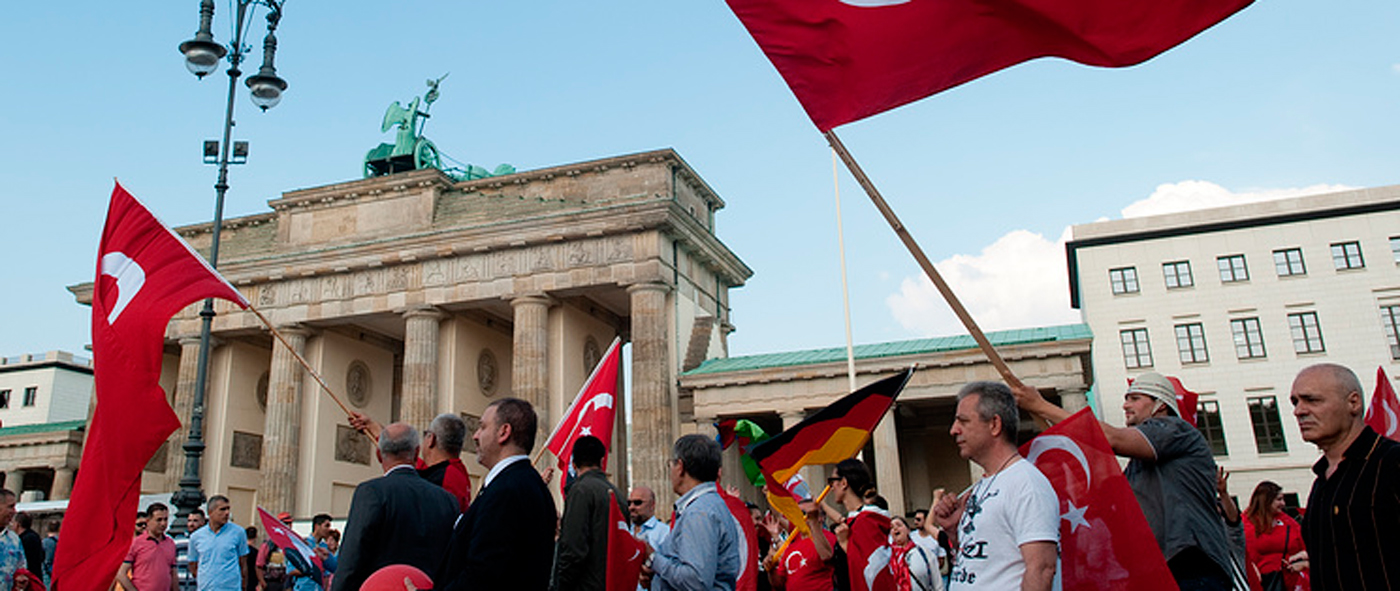Union of European Turkish Democrats (UETD), which organized rallies of Turkish politicians in Europe, has canceled all further such events in Germany. The reason: freedom of speech and security are not provided at the appropriate level in Germany. There is no doubt that this step of the UETD was directly aligned with the ruling Turkish Justice and Development Party. Thus, Turkey and Germany have passed the peak of the conflict, which has arisen as a result of the reluctance of the German authorities to allow Turkish representatives to political rallies before Turkish citizens residing in Germany. However, it in no way means easing the positions of the two NATO allies. Rather, the situation just got to the point where none of the parties is ready to raise rates further, because the pragmatists in Ankara and Berlin actually reached their goals and are not interested in further strengthening of confrontation.
Both the German and the Turkish authorities have benefited from the internal political conflict. The German side, in particular, has focused public attention on a common enemy - Erdogan and his supporters in Germany - which is a threat to domestic tranquility in Germany. During the last month the Turkish President Erdogan has not only dominated the editorial choice of the leading German media - sometimes there was a feeling that other topics for discussion do not exist. The President of Turkey was proclaimed the main problem of Germany, and active debates on this subject have allowed politicians from CDU and CSU to make pretty hard right and anti-Turkish statement, which relished a massive voter. Criticizing the "authoritarian Islamist Turkish President" is a win-win. Convinced Democrats support this criticism because of the "authoritarian", enemies of Islam because of the "Islamist", and nationalists because of "Turkey". CDU and CSU would not mind to seize votes from the right-wing populists of the AfD, using the "Turkish wave". Indeed, in the Netherlands, a similar roll to the right of the Prime Minister Mark Rutte has brought certain success to his party, almost pushing ultra Wilders out.
Likewise, President Recep Tayyip Erdogan was able to largely achieve the mobilization of the Turks in Europe, playing on their national sentiments and the classical division of "they are against us". The problems of integration in European society do exist, and many Turks born or who have lived in European countries for decades still do not feel themselves accepted. And when in such a situation the representatives of the AKP ardently declare from the stands that Turkey is guarding the interests of its citizens in Europe, and the problems of the European Turks are the problems of Turkey, it is not surprising that the sympathies of this group of the population are on the side of the historical homeland. Few German politicians do such active work with this migration group.

The resolution of the Bundestag on the 'Armenian genocide' adopted last year for the sake of foreign policy conditions, which hurted national feelings of the overwhelming majority of Turks in Germany and abroad, also played its role. It is noteworthy that during the voting on the resolution none of the political forces represented in the Bundestag supported the Turks, even the social democrats, which are traditionally friendly to Ankara supported the resolution. It is obvious that the German Turks experienced a serious disappointment in the entire German political establishment and turned their gaze to their historical homeland.
Finally, the difference in the attitude of the German authorities towards rallies of Erdogan's supporters and the Turkish Kurds did not escape the attention of the German Turks. If Turkish domestic policy has nothing to do on German soil, then this should apply equally to the supporters of the AKP, opponents of constitutional reforms, and the Turkish supporters of the Kurdistan Workers' Party. A few days ago the latter gathered thousands of people rallied against Erdogan in Frankfurt, the rally was full of the PKK flags and portraits of Abdullah Ocalan. And similar actions are not uncommon in Germany. The PKK is considered a terrorist organization in Germany and the EU as a whole. And these demonstrations, which gather supporters of a group, which is considered terrorist under German law, are for some reason not abolished by local authorities because of "security threats". But statements of the Turkish ministers, in the opinion of the German authorities, represent such a threat.
Obviously, the refusal of the Turkish authorities from holding political rallies in Germany will not be their last problem. The antagonism between the two countries begins to be systemic and ideological, the contradictions in the interests of the EU and Turkey on a number of issues of international politics (in particular, the Kurdish problem, Syria, Russia's energy policy) remain on the agenda and will continue to be felt in the future. However, from the point of view of pre-election tactics, it seems that the current conflict is a win-win situation for both German and Turkish authorities.






